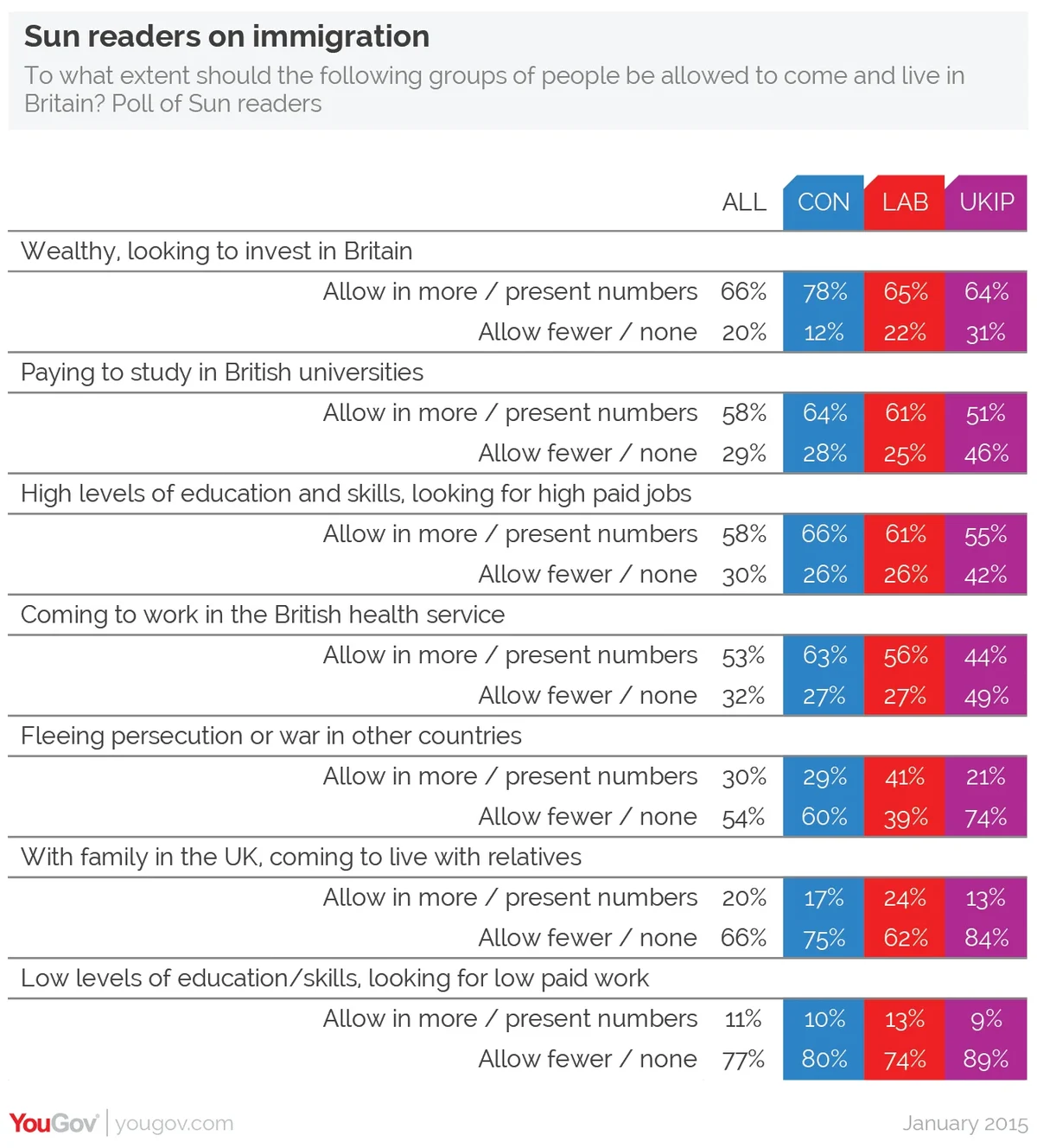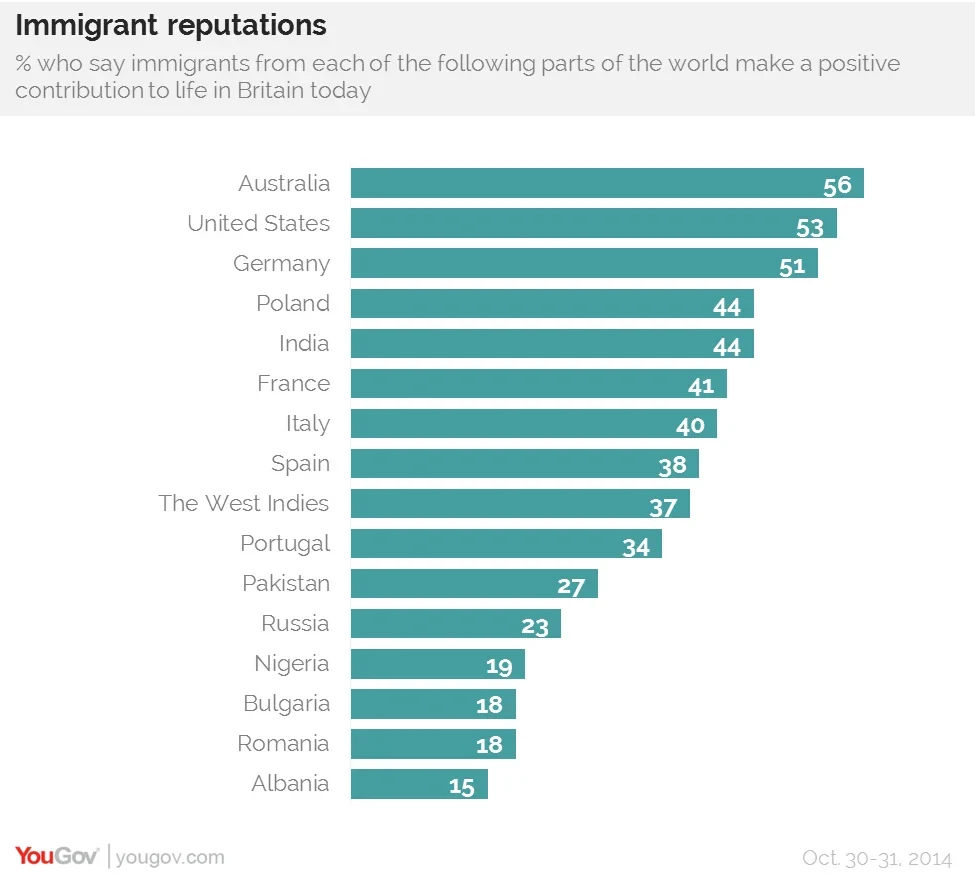Most of us want far less immigration – but when asked about the men and women from particular parts of the world that we have come to know, our hostility starts to fade
That fine philosopher, Linus (yes, the Peanuts character), once remarked: ‘I love mankind; it’s people I can’t stand’. These days, with immigration, it’s the other way round: we like the people but not the principle.
A YouGov poll of Sun readers produces the entirely unsurprising finding that only 10% think immigration in the past ten years has been good for Britain, while 71% think it has been bad for us. But when we ask them who should be allowed in, clear majorities are happy for people in four significant categories to continue coming to Britain in either the same or greater numbers than today. And it’s worth noting that Ukip supporters are only slightly less willing than Labour or Tory voters to welcome more immigrants:

How do we reconcile these figures with the overall hostility to immigration as a whole? Part of it stems from a belief that Britain has been over-run with the ‘wrong’ immigrants, such as welfare tourists who come here for child benefit and Job Seekers’ Allowance, not to help our economy to grow. Past YouGov research has shown that many people vastly overstate the numbers of such people.
In addition, I suspect that many of us subconsciously draw a distinction between ‘immigration’ as a phenomenon and ‘immigrants’ as people. The phenomenon frightens us. It sums up our sense that Britain has gone to the dogs, with too few secure jobs and affordable homes, too much crime, overcrowded schools and an overstretched NHS. We ignore or disbelieve statistics that recent years have seen more jobs, less crime, smaller classes and more NHS operations. We think life is worse than for decades. A recent Private Eye cover captured the mood perfectly, when it showed a taxi driver asking a Ukip activist where he wanted to be taken, to be told: ‘1957’.
Yet when we contemplate immigrants rather than immigration – the people rather than the phenomenon – our attitude often changes. Not many of us are offended by people who settle in Britain to build companies, study science, treat patients, run corner shops, cook take-aways or play Premiership soccer. In the streets and schools, pubs and offices in much of urban Britain, people from all round the world mix perfectly happily. The stories of division and hostility are striking for their rarity. The successful evolution of our nation of many cultures is one of the great success stories of the past sixty years.
This observation is reinforced by a poll we conducted last October for Sky News. We listed seventeen countries and asked people in each case whether they thought immigrants from there made a positive or negative contribution to today’s Britain. Few people will be surprised that Australians have the best reputation, with Americans and west Europeans also scoring well.

The results for people from the former communist countries are more varied. On balance, we rather like the Poles who have settled in Britain. We are less fond of people from Russia, Bulgaria, Romania and Albania. The finding for Albanians is curious. Hardly anyone living in Britain comes from there – just 13,000 according to the 2011 census; and as it’s outside the European Union, the EU’s freedom of movement rules don’t apply. The fact that our reaction is much the same as to Bulgaria and Romania suggests that public attitudes are shaped more by generalised fears than by personal experience. (Indeed, the fact that the figures for Poland are so different supports this interpretation. Around 600,000 Poles live here. Millions of us have had direct contact with one or more of them. Few of us seem to have cause for complaint.)
YouGov’s figures for immigrants from non-white countries will also surprise some people. Two of the four we tested produced clearly positive responses: immigrants from India are seen as making a positive contribution by 44-19%; immigrants from the West Indies are seen as making a positive contribution by 37-20%. Pakistan is narrowly negative; only Nigeria provokes anything like the hostility we accord to people from Bulgaria and Romania. Compared with the 1960s and 1970s, when Enoch Powell was exploiting dislike of Caribbean immigrants in particular, the passage of time and the accumulation of personal contacts have changed our attitudes.
As with our poll of Sun readers, these figures seem to suggest a different, far less hostile, attitude than results to questions about the overall level of immigration. Most of us want far less of it; but when asked about the men and women from particular parts of the world that we have come to know, our hostility starts to fade. My guess is that, in time, our opposition to people from Bulgaria and Romania will also fade. With immigrants as people, as distinct with immigration as a short-hand for a broad sense of happiness with today’s Britain, familiarity usually breeds content, not contempt.







